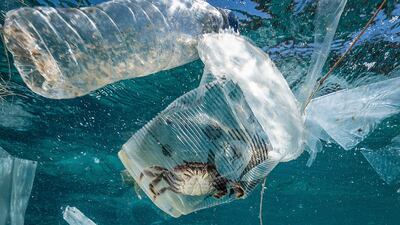The Environment Agency Abu Dhabi has announced an ambitious plan to phase out non-reusable plastics in two years’ time, the first initiative of its kind in the country. Once again, Abu Dhabi is leading the way in the region in coming up with solutions to modern challenges.
The scheme will target several disposable plastic products such as non-reusable bags, which will be charged before being gradually banned, as well as cutlery – oftentimes sent with delivery meals – and disposable plates and straws.
Curbing plastic consumption is crucial in keeping our oceans clean and protecting marine life. Every year, 13 million additional tonnes of plastic waste pollute the oceans and seas, endangering wildlife and contaminating the water. In the words of Dr Shaikha Al Dhaheri, secretary general of the Environment Agency Abu Dhabi, “there will be more plastic than fish in the oceans and seas by 2050” if we do not take immediate steps to change the situation. Taking action to stop plastic pollution has now become a necessity, but it is part of a wider national drive.
The ground-breaking move is a component of Ghadan 21, a Dh50 billion scheme launched by Sheikh Mohamed bin Zayed, Crown Prince of Abu Dhabi and Deputy Supreme Commander of the Armed Forces, to equip the country with the right tools to face the challenges that the future might bring.
Ghadan 21 is a holistic three-year plan to promote the development of a knowledge-based economy in the UAE, by supporting innovation, technology, entrepreneurship and making way for a more sustainable future. For example, the scheme has provided funding for 39 start-ups at Hub71, a UAE-based incubator that also launched the Abu Dhabi Climate Initiative, which aims to boost research in water and climate technology.
Enacting better legislation is not only crucial to effect real change, it is needed to trigger a positive shift in our daily habits, and enable residents to become part and parcel of the push for a greener UAE. For instance, Abu Dhabi’s gradual plastic ban also includes a bottle-return scheme, which will give residents compensation for recycling used containers.
The scheme relies on rewarding people for their good actions for the environment and encourages everyone to take part in the process. It is our collective responsibility to look after our planet, and protect its vulnerable ecosystems. Small changes in our habits such as remembering to take a reusable bag with us before going to the supermarket, or sharing a ride with colleagues to get to our workplace can go a long way. Whether through a small personal action or an emirate-wide initiative, considering initiatives to protect the environment is part of a wider effort to ensure Abu Dhabi’s future is bright and secure.


